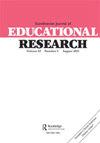权力和包容。德国和瑞典特殊教育工作者在全纳学校中的角色和工作
IF 1.5
4区 教育学
Q2 EDUCATION & EDUCATIONAL RESEARCH
Scandinavian Journal of Educational Research
Pub Date : 2023-09-28
DOI:10.1080/00313831.2023.2263481
引用次数: 0
摘要
本文对在全纳学校工作的瑞典和德国特殊教育工作者进行了一项比较访谈研究(N = 45),以了解全纳教育是如何通过提供特殊教育需求(SEN)支持来实施的;以及这两个方面是如何受到国家特殊性的制约的。根据我们的访谈分析,我们建议一种分析方法,从比较的角度来检查和比较学校组织提供的特殊教育支持。该装置是一个9维矩阵,从三个层面(个人、团体、组织)来理解与三个领域(教育、社会、行政)相关的现象。利用这个矩阵,我们解释了在实施包容性学校方面的国家差异。与德国相比,瑞典的特殊教育工作者在全纳学校中拥有更大的权力,并且在组织层面上做出更多关于特殊教育的重要决策,而不仅仅是针对需要特殊支持的个别学生。本文章由计算机程序翻译,如有差异,请以英文原文为准。
Power and inclusion. German and Swedish special educators’ roles and work in inclusive schools
This article presents a comparative interview study (N = 45) with Swedish and German special educators working in inclusive school settings in order to gain an understanding of how inclusive education is operationalized by the provision of special education needs (SEN) support; and how both aspects are conditioned by nation-specific particularities. Drawing on our interview analyses, we suggest an analytical device for examining and comparing the provision of SEN support in school organizations from a comparative perspective. The device is a 9-dimensional matrix, understanding the phenomenon in terms of three levels (individual, group, organizational) related to three domains (educational, social, administrative). Employing this matrix, we explain national differences in operationalizing inclusive schools. Compared with Germany, in Sweden, special educators have much more power in the inclusive school, and significantly more important decisions regarding SEN are made at an organizational level, and not only regarding individual students in need of special support.
求助全文
通过发布文献求助,成功后即可免费获取论文全文。
去求助
来源期刊

Scandinavian Journal of Educational Research
EDUCATION & EDUCATIONAL RESEARCH-
CiteScore
5.40
自引率
5.30%
发文量
70
期刊介绍:
The Scandinavian Journal of Educational Research is an international refereed research journal focusing on central ideas and themes in educational thinking and research. The journal welcomes reports on philosophical, historical, comparative, experimental and survey studies and has no preferences - except quality - concerning the authors" choices of methodological perspectives. The journal reflects ongoing educational research in the nordic countries. It also encourages scholarly discussions on vital concepts, new issues and themes of importance for education in the future.
 求助内容:
求助内容: 应助结果提醒方式:
应助结果提醒方式:


